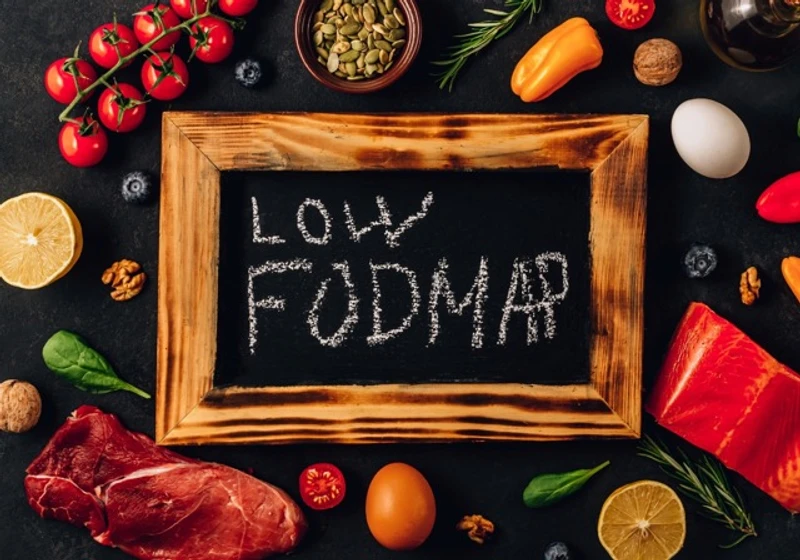
Ultra-processed foods and IBS

The debate around ultra-processed foods (UPFs) has recently gained significant attention due to increasing scientific research and increased consumer awareness. But what exactly are UPFs, and what do we know about their role in the development of Irritable Bowel Syndrome (IBS)? While some studies suggest a potential link, the evidence remains limited, and no definitive conclusions can be drawn about whether UPFs directly contribute to IBS.
What Are Ultra-Processed Foods?
The food we eat exists on a spectrum of processing. To better understand the level of processing in our diet, researchers often use the NOVA classification system, developed by scientists at the University of São Paulo in Brazil (1). This system divides foods into four categories:
1) Unprocessed or minimally processed foods – Whole foods with little to no processing, such as fresh vegetables, unsalted nuts, and frozen natural produce.
2) Processed culinary ingredients – Basic substances used to prepare and enhance foods, like oils, butter, sugar, and salt.
3) Processed foods – Foods made by combining categories 1 and 2, mainly for flavor or preservation. Examples include canned vegetables, cheese, canned fish, and freshly made bread.
4) Ultra-processed food and drinks (UPFs) – Industrially manufactured products with additives rarely found in home kitchens, such as colorings, emulsifiers, and artificial flavors. These foods are designed for convenience, are highly palatable and often have long ingredient lists. Examples include packaged snacks, carbonated drinks, energy bars, instant noodles, and frozen ready meals. UPFs are heavily marketed and usually have long shelf lives (2).
While small amounts of processing (such as freezing or adding some preservatives) may occur in all food groups, UPFs stand out due to their extensive modification and the presence of additives (2). The United Nations has expressed concerns about the rising consumption of UPFs, not just for health reasons but also due to their economic and environmental impact, which you can read more about here: The UN Decade of Nutrition, the NOVA food classification and the trouble with ultra-processing.
How are UPFs Linked to Health Issues?
UPFs have been linked to various health conditions, including cardiovascular disease (3, 4), diabetes (5) and cancer (6). Studies show that diets high in UPFs often have lower nutritional quality, with increased saturated fat, total fat, and free sugar intake, as well as reduced fiber, protein, and essential micronutrients (7). These are known drivers of several health related issues.
Additionally, research has suggested a potential link between UPFs and some inflammatory bowel diseases (IBD) (8, 9, 10, 11, 12). A meta-analysis from 2023 found that higher UPF consumption was associated with an increased risk of Crohn’s disease, but not ulcerative colitis (13). More research is needed to understand the exact mechanisms behind these associations.

Availability and consumption of UPFs are increasing. In some Western countries, over 50% of energy consumption comes from UPFs (14, 15).
The NOVA classification system categorizes foods based on their level of processing but does not take their nutritional content into account. As a result, both packaged whole-grain bread and chocolate can be classified as ultra-processed foods (UPF), even though whole-grain bread contains essential nutrients that contribute to a balanced diet. This shows that two people who consume a lot of ultra-processed food may have very different diets. However, many studies do not consider these differences, making it difficult to draw clear conclusions. Therefore, more research is needed to understand the mechanisms behind these possible associations.
One of the challenges often linked to ultra-processed food is that it can contribute to high calorie intake, which is associated with certain health problems. However, food processing can also be used to reduce calorie content, as seen in products like low-fat alternatives, sugar-free drinks, and low-calorie sweeteners. By lowering calorie intake, these processed foods can help prevent excessive calorie consumption and support healthier weight management.
Many critics argue that this is an oversimplification of the relationship between diet and health. Instead of focusing solely on the degree of processing, many experts believe it is more meaningful to look at specific nutrients - such as saturated fat, sugar, and fiber - which are known to have a significant impact on our health.
The Connection Between UPFs and IBS
Irritable Bowel Syndrome (IBS) is a common gastrointestinal disorder affecting around 10% of the global population (17). The exact causes of IBS are still unclear, but factors like altered gut microbiota, digestive motility issues, an imbalance gut-brain axis, and visceral hypersensitivity are believed to play a role.
As UPFs consumption has risen, so has the prevalence (how common something is) of IBS. While no direct causation has been proven, some studies suggest an association between high UPF intake and risk of IBS (18, 19).
Two studies have investigated the link between UPF intake and risk of IBS:
1) Wu et al 2024: A large prospective cohort study of nearly 200,000 participants found that higher UPF consumption increased the risk of developing IBS. Participants were followed for a median of 11.3 years, and results were consistent even adjusting for factors like age, sex, BMI, smoking, and alcohol intake (18).
2) Schnabel et al. 2018: A cross-sectional study from the French NutriNet-Santé cohort, including over 30,000 participants, found that individuals in the highest UPF intake quartile had 25% higher odds of IBS compared with those in the lowest quartile (19).
Possible explanations of the link include food additives found in UPFs, which may affect gut health, as well as high-FODMAP ingredients in many UPFs, which are known to trigger IBS symptoms and low fiber content in a diet high in UPFs. These studies suggest a potential link, however, as observational studies, they cannot definitively establish that UPFs directly cause IBS. This is because these studies cannot account for all factors influencing the health of these individuals, and other confounding factors may be at play, such as other life style differences, genetics, etc. More research is needed to clarify these relationships.
While more research is needed to understand the direct role of UPFs in IBS, one dietary approach has consistently been shown to reduce IBS symptoms: the low FODMAP diet.
The Low FODMAP Diet: The Best Dietary Approach for IBS
While we wait for more research on UPFs and IBS, one dietary approach is considered an effective treatment for the majority of IBS sufferers: the low FODMAP diet (20). This scientifically backed diet, developed by scientists at Monash University, significantly reduces IBS symptoms by eliminating fermentable short-chain carbohydrates that can cause digestive discomfort such as bloating, gas and pain in some individuals (21).

The diet follows a structured 3-step process to identify and eliminate specific food triggers while ensuring balanced nutrition (21). However, given that the low FODMAP diet is already restrictive, further eliminating foods like UPFs can pose additional challenges. Instead of completely avoiding UPFs, a more practical approach is to prioritize whole, nutrient-dense foods while making informed choices about ultra processed options.
Low FODMAP Foods That Are Not Ultra Processed
Luckily, there are many nutritious foods that are unprocessed or just “processed” that can safely be included in a low FODMAP diet:
- Grains: Oats, buckwheat, millet, quinoa
- Nuts and seeds: Peanuts, pecans, macadamia, and most seeds are low FODMAP
- Vegetables and fruit: Plenty of vegetables and fruit are low FODMAP such as kale, pak choi, carrot, canned corn, pineapple, kiwi, cantaloupe, blueberries and more (frozen options are just as nutritious!)
- Olive oil, butter, maple syrup, herbs, lots of spices, cheese
- Protein sources: Fish, seafood, meat, firm tofu, canned lentils, chickpeas and beans
- Bread: Sourdough wheat and spelt bread
How Noba Can Help
Noba is an app designed to support individuals following the low FODMAP diet - or those who know someone who is. With Noba, you can:
✅ Find and navigate low FODMAP food products
✅ Track food intake and symptoms
✅ Access expert-backed guidance on managing IBS
✅ Discover low FODMAP recipes
If you're navigating a low FODMAP diet, know someone with IBS, or want to explore how Noba works - read more here!
References:
- 1. Monteiro CA, Levy RB, Claro RM, Castro IR, Cannon G. A new classification of foods based on the extent and purpose of their processing. Cad Saude Publica. 2010 Nov;26(11):2039-49. doi: 10.1590/s0102-311x2010001100005. PMID: 21180977.
- 2. Monteiro CA, Cannon G, Levy RB, Moubarac JC, Louzada ML, Rauber F, Khandpur N, Cediel G, Neri D, Martinez-Steele E, Baraldi LG, Jaime PC. Ultra-processed foods: what they are and how to identify them. Public Health Nutr. 2019 Apr;22(5):936-941. doi: 10.1017/S1368980018003762. Epub 2019 Feb 12. PMID: 30744710; PMCID: PMC10260459.
- 3. Srour B, Fezeu LK, Kesse-Guyot E, Allès B, Méjean C, Andrianasolo RM, Chazelas E, Deschasaux M, Hercberg S, Galan P, Monteiro CA, Julia C, Touvier M. Ultra-processed food intake and risk of cardiovascular disease: prospective cohort study (NutriNet-Santé). BMJ. 2019 May 29;365:l1451. doi: 10.1136/bmj.l1451. PMID: 31142457; PMCID: PMC6538975.
- 4. Juul F, Vaidean G, Lin Y, Deierlein AL, Parekh N. Ultra-Processed Foods and Incident Cardiovascular Disease in the Framingham Offspring Study. J Am Coll Cardiol. 2021 Mar 30;77(12):1520-1531. doi: 10.1016/j.jacc.2021.01.047. PMID: 33766258.
- 5. Duan MJ, Vinke PC, Navis G, Corpeleijn E, Dekker LH. Ultra-processed food and incident type 2 diabetes: studying the underlying consumption patterns to unravel the health effects of this heterogeneous food category in the prospective Lifelines cohort. BMC Med. 2022 Jan 13;20(1):7. doi: 10.1186/s12916-021-02200-4. PMID: 35022060; PMCID: PMC8756643.
- 6. Fiolet T, Srour B, Sellem L, Kesse-Guyot E, Allès B, Méjean C, Deschasaux M, Fassier P, Latino-Martel P, Beslay M, Hercberg S, Lavalette C, Monteiro CA, Julia C, Touvier M. Consumption of ultra-processed foods and cancer risk: results from NutriNet-Santé prospective cohort. BMJ. 2018 Feb 14;360:k322. doi: 10.1136/bmj.k322. PMID: 29444771; PMCID: PMC5811844.
- 7. Martini D, Godos J, Bonaccio M, Vitaglione P, Grosso G. Ultra-Processed Foods and Nutritional Dietary Profile: A Meta-Analysis of Nationally Representative Samples. Nutrients. 2021 Sep 27;13(10):3390. doi: 10.3390/nu13103390. PMID: 34684391; PMCID: PMC8538030.
- 8. Chen J, Wellens J, Kalla R, Fu T, Deng M, Zhang H, Yuan S, Wang X, Theodoratou E, Li X, Satsangi J. Intake of Ultra-processed Foods Is Associated with an Increased Risk of Crohn's Disease: A Cross-sectional and Prospective Analysis of 187 154 Participants in the UK Biobank. J Crohns Colitis. 2023 Apr 19;17(4):535-552. doi: 10.1093/ecco-jcc/jjac167. PMID: 36305857; PMCID: PMC10115229.
- 9. Vasseur P, Dugelay E, Benamouzig R, Savoye G, Lan A, Srour B, Hercberg S, Touvier M, Hugot JP, Julia C, Buscail C. Dietary Patterns, Ultra-processed Food, and the Risk of Inflammatory Bowel Diseases in the NutriNet-Santé Cohort. Inflamm Bowel Dis. 2021 Jan 1;27(1):65-73. doi: 10.1093/ibd/izaa018. PMID: 32055825.
- 10. Narula N, Wong ECL, Dehghan M, Mente A, Rangarajan S, Lanas F, Lopez-Jaramillo P, Rohatgi P, Lakshmi PVM, Varma RP, Orlandini A, Avezum A, Wielgosz A, Poirier P, Almadi MA, Altuntas Y, Ng KK, Chifamba J, Yeates K, Puoane T, Khatib R, Yusuf R, Boström KB, Zatonska K, Iqbal R, Weida L, Yibing Z, Sidong L, Dans A, Yusufali A, Mohammadifard N, Marshall JK, Moayyedi P, Reinisch W, Yusuf S. Association of ultra-processed food intake with risk of inflammatory bowel disease: prospective cohort study. BMJ. 2021 Jul 14;374:n1554. doi: 10.1136/bmj.n1554. PMID: 34261638; PMCID: PMC8279036.
- 11. Meyer A, Dong C, Casagrande C, Chan SSM, Huybrechts I, Nicolas G, Rauber F, Levy RB, Millett C, Oldenburg B, Weiderpass E, Heath AK, Tong TYN, Tjønneland A, Kyrø C, Kaaks R, Katzke VA, Bergman MM, Palli D, Masala G, Tumino R, Sacerdote C, Colorado-Yohar SM, Sánchez MJ, Grip O, Lindgren S, Luben R, Gunter MJ, Mahamat-Saleh Y, Boutron-Ruault MC, Carbonnel F. Food Processing and Risk of Crohn's Disease and Ulcerative Colitis: A European Prospective Cohort Study. Clin Gastroenterol Hepatol. 2023 Jun;21(6):1607-1616.e6. doi: 10.1016/j.cgh.2022.09.031. Epub 2022 Oct 12. PMID: 36243353.
- 12. Lo CH, Khandpur N, Rossato SL, Lochhead P, Lopes EW, Burke KE, Richter JM, Song M, Ardisson Korat AV, Sun Q, Fung TT, Khalili H, Chan AT, Ananthakrishnan AN. Ultra-processed Foods and Risk of Crohn's Disease and Ulcerative Colitis: A Prospective Cohort Study. Clin Gastroenterol Hepatol. 2022 Jun;20(6):e1323-e1337. doi: 10.1016/j.cgh.2021.08.031. Epub 2021 Aug 28. PMID: 34461300; PMCID: PMC8882700.
- 13. Narula N, Chang NH, Mohammad D, Wong ECL, Ananthakrishnan AN, Chan SSM, Carbonnel F, Meyer A. Food Processing and Risk of Inflammatory Bowel Disease: A Systematic Review and Meta-Analysis. Clin Gastroenterol Hepatol. 2023 Sep;21(10):2483-2495.e1. doi: 10.1016/j.cgh.2023.01.012. Epub 2023 Jan 31. PMID: 36731590.
- 14. Rauber F, da Costa Louzada ML, Steele EM, Millett C, Monteiro CA, Levy RB. Ultra-Processed Food Consumption and Chronic Non-Communicable Diseases-Related Dietary Nutrient Profile in the UK (2008⁻2014). Nutrients. 2018 May 9;10(5):587. doi: 10.3390/nu10050587. PMID: 29747447; PMCID: PMC5986467.
- 15. Martínez Steele E, Popkin BM, Swinburn B, Monteiro CA. The share of ultra-processed foods and the overall nutritional quality of diets in the US: evidence from a nationally representative cross-sectional study. Popul Health Metr. 2017 Feb 14;15(1):6. doi: 10.1186/s12963-017-0119-3. PMID: 28193285; PMCID: PMC5307821.
- 16. Gibney MJ, Forde CG, Mullally D, Gibney ER. Ultra-processed foods in human health: a critical appraisal. Am J Clin Nutr. 2017 Sep;106(3):717-724. doi: 10.3945/ajcn.117.160440. Epub 2017 Aug 9. Erratum in: Am J Clin Nutr. 2018 Mar 1;107(3):482-483. doi: 10.1093/ajcn/nqx068. PMID: 28793996.
- 17. Black CJ, Ford AC. Global burden of irritable bowel syndrome: trends, predictions and risk factors. Nat Rev Gastroenterol Hepatol. 2020 Aug;17(8):473-486. doi: 10.1038/s41575-020-0286-8. Epub 2020 Apr 15. PMID: 32296140.
- 18. Wu S, Yang Z, Liu S, Zhang Q, Zhang S, Zhu S. Ultra-Processed Food Consumption and Long-Term Risk of Irritable Bowel Syndrome: A Large-Scale Prospective Cohort Study. Clin Gastroenterol Hepatol. 2024 Jul;22(7):1497-1507.e5. doi: 10.1016/j.cgh.2024.01.040. Epub 2024 Mar 21. PMID: 38522476.
- 19. Schnabel L, Buscail C, Sabate JM, Bouchoucha M, Kesse-Guyot E, Allès B, Touvier M, Monteiro CA, Hercberg S, Benamouzig R, Julia C. Association Between Ultra-Processed Food Consumption and Functional Gastrointestinal Disorders: Results From the French NutriNet-Santé Cohort. Am J Gastroenterol. 2018 Aug;113(8):1217-1228. doi: 10.1038/s41395-018-0137-1. Epub 2018 Jun 15. PMID: 29904158.
- 20. Black CJ, Staudacher HM, Ford AC. Efficacy of a low FODMAP diet in irritable bowel syndrome: systematic review and network meta-analysis. Gut. 2022 Jun;71(6):1117-1126. doi: 10.1136/gutjnl-2021-325214. Epub 2021 Aug 10. PMID: 34376515.
- 21. Gibson PR. History of the low FODMAP diet. J Gastroenterol Hepatol. 2017 Mar;32 Suppl 1:5-7. doi: 10.1111/jgh.13685. PMID: 28244673.

